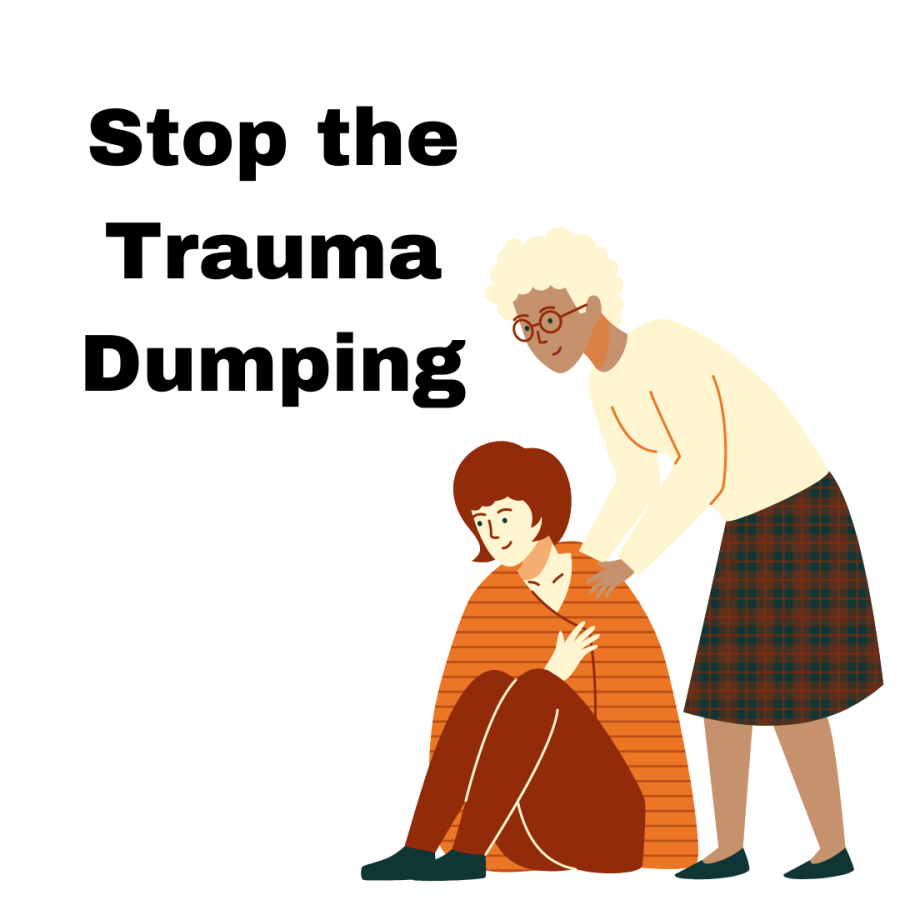Stop Trauma Dumping and Get a Therapist
March 2, 2022
I want you to think back to episode 58, “Missing Identity,” from season three of “SpongeBob SquarePants.” The scene according to the transcript of this episode goes as follows: [At a diner, it is raining outside. A man in a hat with a suit and tie is sitting at the bar, looking for his pen. A waitress pours him some coffee into his cup.] Ted, the man with the hat and suit, says, “Oh, no, I lost my pen.” The waitress responds with, “You can borrow mine.” Once Ted thanks the waitress, SpongeBob says, “I lost something once. I lost something I couldn’t live without– my identity.” [the two fish look at SpongeBob then they ignore him] This scene perfectly describes and portrays the awkwardness of trauma dumping.
Trauma dumping is when a person shares their trauma unwarranted and without permission from the other party. Usually, trauma is dumped in an inappropriate place and time to someone who may not have the capability to handle the information. It is not at all shocking that trauma dumping is on the rise when social media platforms like TikTok have become a breeding ground for this phenomenon. Oversharing has been a concept that is encouraged and often rewarded with millions of likes.
I understand venting can be very cathartic but there needs to be a line drawn between venting and trauma dumping. I work for the Student Activities Board and numerous times at my events I encounter seemingly innocent conversations that pivot into much darker discussions about their molestation as a child. I cannot even express the level of discomfort I had during that situation when I was just trying to help students make earrings.
It is completely healthy to vent about subjects that are superficial or inconveniences that are minor. Especially with everyone living through a global pandemic, there are many times we need to discuss our frustrations with our friends. However, when you casually start going into depth about your trauma in brief conversations, that is when it starts becoming unproductive and toxic.
Trauma dumpers like to use the excuse, “I just like to use humor to cope with my trauma.” It’s great that you found a coping mechanism that works for you, but I’m a complete stranger and the things you just said are incredibly triggering and problematic. You may feel better after trauma dumping, but the person you just dumped it onto is left feeling uncomfortable and overall bad.
With too much serious and unexpected information being discussed, I know I start feeling very drained and depressed. I think it’s important to note that not everyone has the ability to take in other people’s trauma because their own lives are also filled with traumatic experiences.
If you trauma dump constantly for attention or sympathy, it may have an adverse effect and cause people to avoid you. People will push you away because they grow tired with hearing the details of your trauma. Many grow uncomfortable and do not know how to respond to these kinds of experiences. Furthermore, you might find that the people you dump on have resentment toward you for not realizing how your trauma is impacting their mental health.
If you find yourself constantly getting trauma dumped by friends, strangers or even your parents, it is crucial that you create boundaries. You can empathize and clarify that you care for them but explain that you do not feel comfortable with these kinds of conversations. You are not a bad person for protecting your own peace.
It is always important to open up and express yourself; however, if you are going to discuss your trauma, ask the other person if they are willing and comfortable to listen to your problems. Discussing your frustrations with your friends is totally okay, but some conversations should be reserved between you and a therapist. Your friends should not have to play therapist because it is not healthy for you or them. It is important to remember that you should not be discussing your trauma in a public space nor with a stranger.










